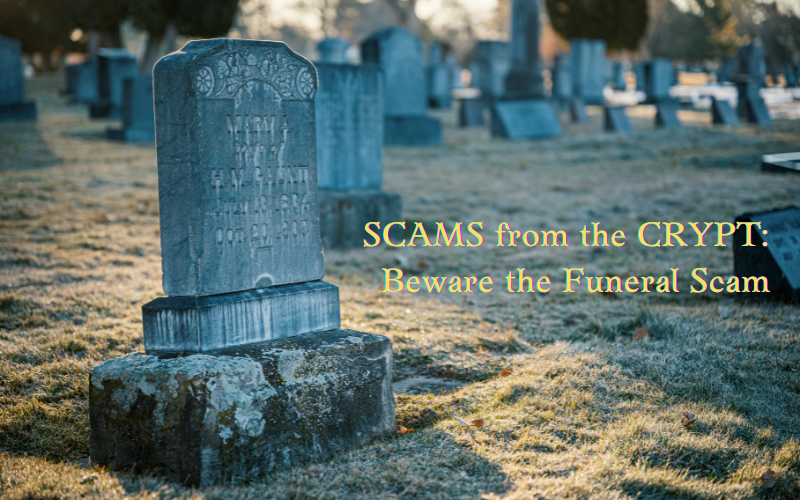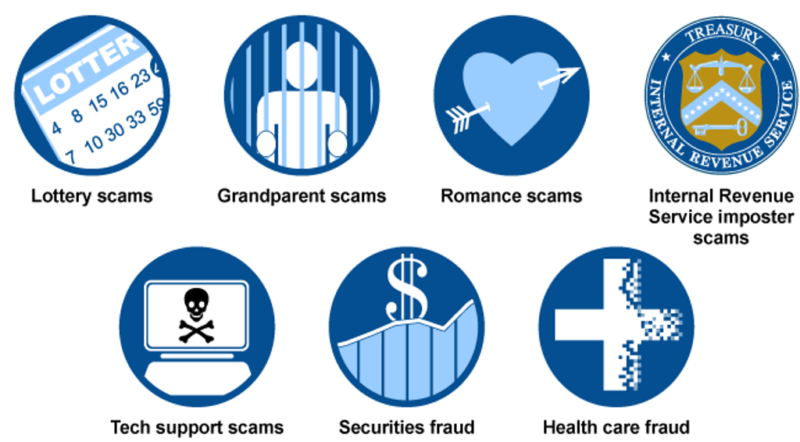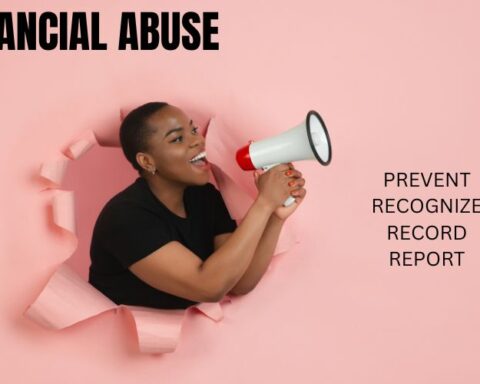Original Article by Sherrie Johnson, 5/15/2022
Every year, scammers across the world target unsuspecting, vulnerable populations to extort money, information, and personal data they can use. Unfortunately, this occurs in the funeral industry as well. At one point, funeral industry scams were so prevalent that the Federal Trade Commission (FTC) had to lay down the law with the federally enforced Funeral Rule.
Jump ahead to these sections:
- Common Prepaid Funeral Scams
- Common Funeral Planning, Burial, or Cemetery Scams
- Common Funeral Insurance Scams
The FTC’s Funeral Rule prevents funeral homes from taking advantage of grieving families who need to purchase funeral plans, caskets, urns, and mortuary services. Not only is the rule in place, but every year agents from the FTC go undercover to make sure it’s actively enforced.
While it is true that the majority of funeral homes and mortuaries do care about their customers, it’s always best to prepare yourself so you know how to avoid a scam.
Common Prepaid Funeral Scams
When you plan your funeral, the rule of thumb is to pre-plan but do not pre-pay. Prepaid funeral scams are all too common and prey on people trying to take some of the burden of funeral expenses off their family members.
1. Prepaid funeral with services
The most common prepaid funeral scam is when someone tries to sell you a package and have you prepay for your funeral and the services with it. While there are some legitimate prepaid funeral plans, it’s critical to be extremely wary of these options.
In one recent scam, the services provider collected money as pre-payment for funeral services. Rather than putting the money into a trust as he should have, the provider embezzled it, used it to pay off funerals for claimants, and put it into incredibly risky investments. In the end, he scammed more than 97,000 people, funeral homes, financial institutions, and insurance associations out of prepaid funeral money.
While planning what you want for your funeral is wise and setting aside money in a trust for funeral expenses is even better, always be wary when you get a phone call asking if you want to prepay your funeral through a third-party agency.
How to avoid it: If you still like the idea of prepaying through a third party, take some precautions to make sure your money is safe:
- Check qualifications. Read ratings and reviews from third-party rating sites such as Trustpilot and the Better Business Bureau.
- Discuss your plans with family members and share the company’s information. Having another pair of eyes in the process can help you spot oddities and behavior that may raise red flags.
- Get a clear trail regarding where your money goes in writing. Per the FTC, the business must put it into a safe holding place such as a life insurance policy in the name of the customer or investments like government-backed securities that are due and available upon the death of the customer.
- Understand what happens to your money if the company goes out of business. Get it in writing.
- Determine whether cancellation is possible if, for example, you move, pass away overseas, or need to terminate the contract for some reason.
- Get copies of the documents and ensure your family members have copies of the contract.
2. Prepaid cremation
The prepaid cremation plan scam works much the same way as the prepaid funeral scam. A business sells you a cremation package at an agreed-on price. Since you’re signing up pre-need, the business may be able to offer you a better rate than you’d receive otherwise. If, however, the company you’re dealing with isn’t above board, you might just be giving your money to a scammer.
How to avoid it: The ways to avoid getting scammed out of your hard-earned money follow the same steps as the funeral prepaid plans. Follow the six steps listed above when considering any prepay plan whether it’s for a funeral or cremation service.
Common Funeral Planning, Burial, or Cemetery Scams
Sometimes scams don’t appear obvious and often, the most successful ones are the most subtle. Here are several to watch.
3. The “buy this, not that” casket scam
This scam occurs when a funeral home director purposely tries to limit your options. Rather than give you a price list, the director shows you the top three caskets and, while seeming to understand that you’re not made of money, encourage you to buy the middle one. What you don’t know is that the middle option, while less than the first one showed you, is still one of the highest-end options and there are far more less expensive options that are just as good.
Keep in mind: This tactic can also be used for outer burial chambers as well.
How to avoid it: Always ask for a funeral home price list before you look at caskets. If they don’t show you a price list first, they’re violating the FTC Funeral Rule. Also, shop around. Funeral homes must accept any casket you choose, even if you purchase one off the internet.
4. The “protect your loved one” casket scam
If you are told you need to upgrade your casket choice to keep your loved one’s body from deteriorating, it’s a lie. Bodies deteriorate at a regular rate, regardless of the container they’re placed into.
How to avoid it: Spot this lie a mile away. Choose a casket based on the price list, not on a salesman’s pitch. Always request the price list before seeing any caskets in stock. Consider purchasing a casket online or through a third-party retailer to get a better price.
5. The cremation casket scam
If your loved one is getting cremated, you’ll need to purchase or provide a container for their body to be placed into before the cremation process. These containers are incredibly simple, are reminiscent of body bags, and can be purchased inexpensively through a crematory or even cheaper online.
How to avoid it: When cremating a loved one, never let a funeral home or crematory director tell you that you need a nice casket for the cremation, that a full casket is required, or that you’ll give your loved one a better cremation if you purchase one of their caskets. These claims simply are not true.
6. The funeral package scam
Given how much time, energy, people, and paperwork go into executing a funeral, it’s no wonder why funerals are so expensive. However, there are always ways to cut down on costs, rather than pay more than you can afford. Scammers know this and, if you happen to work with a less-than-reputable funeral home, they might try to take advantage of your money-saving ways.
Funeral package scams work like this:
The funeral director asks if you want to bundle your services and casket purchase together to save on the casket. Naturally, you say yes. The director then recalculates costs and shows you what you’ll be saving — a whopping $500 on the casket alone! That’s quite the savings.
Rather than show you the total cost breakdown, you’ll be asked if you want to go forward with the package. Naturally, you think you’re saving a bundle, so you agree. However, when it comes to the final price tag, you might end up paying just as much as if you purchased each item individually. Why? The director will increase the prices of the other services and even add in items you don’t want to raise the price.
How to avoid it: If you are interested in a bundle, ask for an itemized price list for the bundle versus purchasing each item separately. Compare both closely. Make sure the prices for funeral services, the director fee, and other elements remain the same, that nothing extra is added, and that you truly do get a discount. Also, keep your budget close to the vest – never share how much you’re willing to pay for a funeral.
7. The embalming scam
If you or your loved one don’t want to be embalmed, most of the time, you shouldn’t be required to do so. If the burial is delayed, states will require some method of preservation for the body. However, refrigeration is a perfectly acceptable alternative to embalming.
How to avoid it: Don’t let any funeral home tell you that your loved one must be embalmed. If you need to preserve the body, ask about alternative preservation methods. Per the FTC Funeral Rule, you are allowed to choose the services you want.
Common Funeral Insurance Scams
Unfortunately, scams can be found in the funeral insurance world as well. Here is the most common one that you might run into.
8. The automatic insurance
This is one of the most common insurance scams. You get a phone call or an email promising to sell you funeral insurance, no questions asked. The price sounds great and you sign up. Unfortunately, coverage doesn’t kick in for ten years, your premium raises every five years (or less), and in the end either you can’t afford the insurance or your family gets far less than you signed up for.
How to avoid it: Don’t sign up with a no-name company that called you or whose email ended in your spam folder. If you do purchase funeral insurance from a well-known company, always read the fine print to learn exactly what you’re signing up for.
Buyer, Be Aware
Whether you’re planning ahead or purchasing services because of an immediate need, knowing your rights under the FTC Funeral Rule is critical. Inform yourself, shop with someone you trust, and never let a salesman pressure you into choosing something you don’t want.
Sources
- “Prepaid Funeral Scam.” New, Federal Bureau of Investigation, 17 January 2014. fbi.gov/news/stories/prepaid-funeral-scam
- “Funeral Rule.” Truth in Advertising, Federal Trade Commission, 2021. ftc.gov/news-events/media-resources/truth-advertising/funeral-rule
- Slocum, Josh. “What You Should Know About Exploding Caskets.” PostEverything, Washington Post, 11 August 2014. washingtonpost.com/posteverything/wp/2014/08/11/what-you-should-know-about-exploding-caskets/
- ”The FTC Funeral Rule.” Shopping and Saving, The Federal Trade Commission, 2021. consumer.ftc.gov/articles/0300-ftc-funeral-rule












